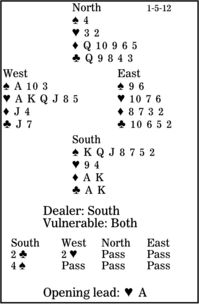Bridge column, January 5: Base your defense on their bidding

In this deal, you are West, looking at your hand and North's, defending against four spades. You lead the heart ace: two, six, nine. You continue with the heart king: three, seven, four. How would you continue?
South opened two clubs, strong, artificial and forcing. You intervened with two hearts. Then, after two passes, South jumped to four spades. What do you make of that?
If South is trustworthy, he will have a hand that suggests he can take 10 tricks. If his hand were one winner weaker, he would have rebid two spades, forcing for one round, then continued with three spades, which would have permitted North to pass with no semblance of a 10th trick.
However, you have three winners: the spade ace and two hearts. So, in theory at least, South should have the hand in the diagram: seven strong spades and doubleton ace-king combinations in both clubs and diamonds.
If that is the case, your only chance of success is to gain two trump tricks.
The winning defense is to lead another heart. South will ruff and play the spade jack, but you take the trick and lead a fourth heart, which East will ruff with the critical spade nine. This uppercuts declarer and promotes your spade 10 to the setting trick.
If you've taken every possible side-suit trick, concede a ruff-and-sluff.
** ** **
COPYRIGHT 2012, UNITED FEATURE SYNDICATE
DISTRIBUTED BY UNIVERSAL UCLICK FOR UFS

